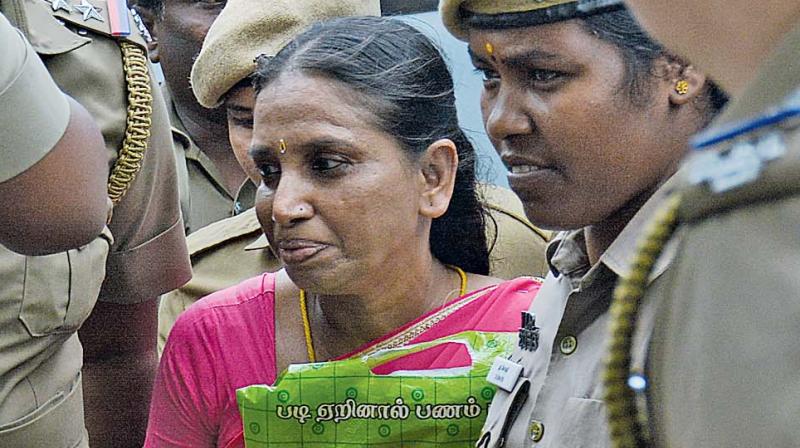Nalini seeks six months, Madras high court grants 30-day parole as per rules

Chennai: The Madras high court has granted the maximum period of 30 days ordinary leave (parole) as per rules, to S.Nalini, serving life sentence in special prison for women at Vellore, for her involvement in Rajiv Gandhi assassination case, as against her plea for six months leave for making arrangements for her daughter’s marriage.
Disposing of a petition from Nalini, a division bench comprising Justices M.M.Sundresh and M.Nirmal Kumar said, “The petitioner is granted 30 days of ordinary leave to facilitate the arrangement and preparation for her daughter’s marriage. It is well open to her to fix the marriage if it is possible within the aforesaid time. This relief is granted to her subject to the compliance of Rule 25 of the Tamil Nadu Suspension of Sentence Rules, 1982”.
The petitioner shall furnish the particulars relating to the names of the sureties, address of the place in which she is going stay apart from due compliance of the rules within one week. Due verification can be made by the police on the compliance of the petitioner within 10 days thereafter. After such verification, the petitioner shall be granted leave for 30 days. On completion of 30 days, the petitioner will have to surrender before the police authorities at 5 pm on the next day, the bench added.
The bench recorded the statement made by the petitioner that she would not give any interview and she would not have any meeting with the leaders of the political parties or any other organisation.
When the case came up for hearing, the police produced Nalini before the court. She read out a prepared speech and expressed her grievance and the ordeal she underwent for nearly 28 years.
She prayed the court to grant 6 months of leave.
Pointing out that rule 22 of the rules provides for a maximum period of 30 days as ordinary leave for a convict at a point of time, state public prosecutor A.Natarajan submitted that the petitioner has to comply with rule 25 of the rules and appropriate orders can be passed in the light of the rules governing.
The bench said, “Though the petitioner has poured out her grievance including incarceration for nearly 28 years, we are not willing to go into the same as any adjudication or observation over it would be beyond the scope of this petition”.
The bench said the fact that the petitioner was having an unmarried daughter, aged about 27 years, who could not live with the parental guidance was not in dispute. Rule 20 also provides for grant of ordinary leave in such an eventuality. However, rule 22 speaks about the maximum of 30 days as ordinary leave. Though the rule speaks about the extension of the eligibility, the same can be only exercised after the initial grant. “Thus, we concur with the statement made by SPP A.Natarajan that 30 days is the maximum period which can be permitted at the time of granting leave under the rules. We also take judicial notice of the fact that the state government itself has made a recommendation for the premature release of the petitioner. From that, we can infer that her conduct is otherwise not adverse. If, in view of the state government, the petitioner can be allowed to lead a normal life and she would not be a hindrance to society otherwise, the request for leave can never be objected, which is also not the cas
e before us”, the bench added.
The bench said taking note of the fact that it was the first time in which the petitioner seeks ordinary leave coupled with the fact that some of similarly placed persons have been granted ordinary leave and in the light of the recommendation made by the state government itself, it was inclined to grant the petitioner 30 days ordinary leave. This leave was subject to the compliance of rule 25, the bench added.
Referring to the plea of Nalini with respect to the payment of cost for the escort, the bench said, “We concur as there is no material to hold that she is a woman of means. Admittedly, she and her husband are in incarceration for decades. Rule 16 of the rules also provides for escort by the government at its own cost. Asking the petitioner to pay the cost would in a way take away the very order passed by us when it is impossible of compliance. In such view of the matter, we direct the authorities not to insist upon any cost for the escort to be provided to the petitioner”.

